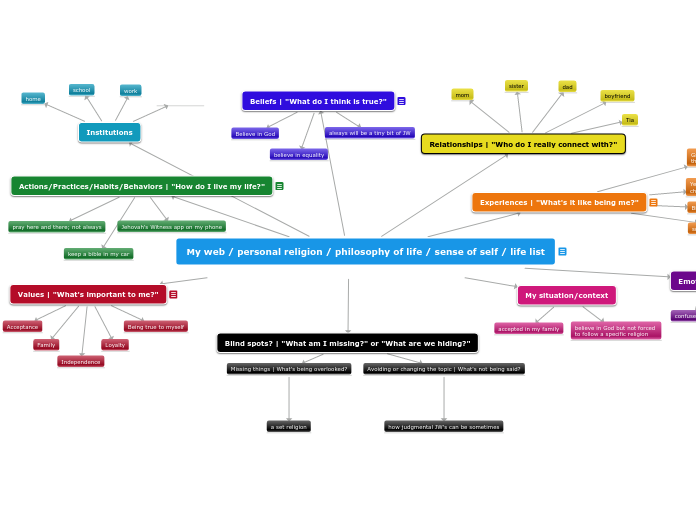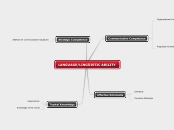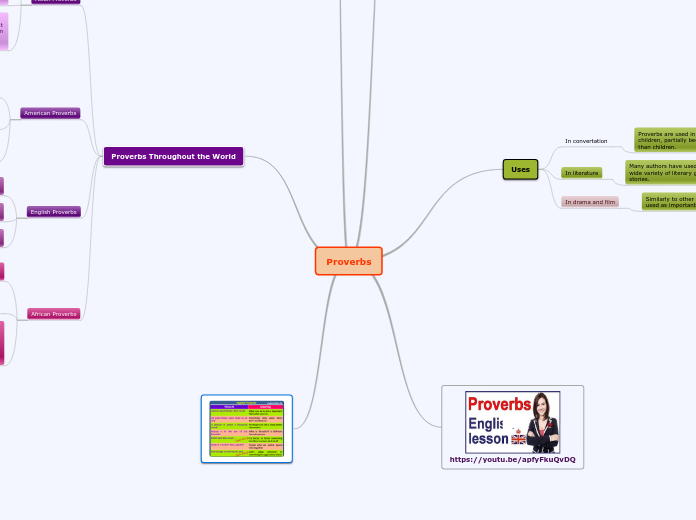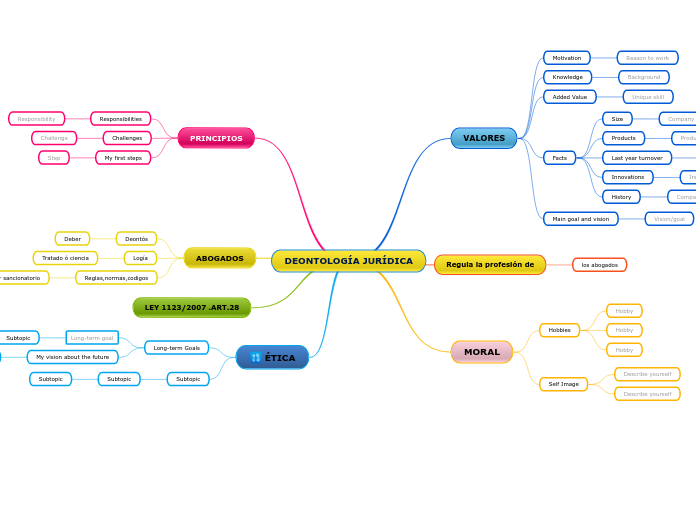Value.
Any tensions w/ web?
Connect it w/ web
Theme or question?
Introduce yourself
My web / personal religion / philosophy of life / sense of self / life list
My worldview. Life map. Web of beliefs. B-system. Personal philosophy. Personal religion. Sense of self. Way of life.
This mind map is an aid to help you figure out your personal worldview: what you believe and value and how those beliefs and values relate to one another as well as to past experiences and how you live your daily life.
Pay attention to whether your beliefs, values, practices, and experiences are consistent with one another or whether you have spots of cognitive dissonance where there's a conflict between, say, two of your beliefs or between a belief and a deeply held value.
As you develop your "web" of beliefs you could also consider how it compares and contrasts with the beliefs, values, practices, and experiences of others. Although perfectly understanding others and where they're coming from is probably unrealistic if you put work into practicing imaginative empathy to construct what seems to you to be their web of beliefs, values, practices, and experiences, you could get some sense of where they're coming from and possibly get a glimpse of what it's like to be them.
This sort of "worldview mind mapping" can also give you insight into the overall, often complicated, rationale of your beliefs and the beliefs of others. Moreover, worldview mind mapping could offer a rough and informal picture of what it means for a belief or practice to be rational or reasonable. This is true especially for our bigger-picture beliefs that can't be directly proven from, say, sense experience, introspection, memory, testimony, or so-called pure reasoning.
My situation/context
believe in God but not forced
to follow a specific religion
accepted in my family
Institutions
work
general public
school
home
Emotions | "What do I feel?"
gratitude/ thankful
anxiety
confused
Blind spots? | "What am I missing?" or "What are we hiding?"
Avoiding or changing the topic | What's not being said?
how judgmental JW's can be sometimes
Missing things | What's being overlooked?
a set religion
Relationships | "Who do I really connect with?"
Tia
boyfriend
dad
sister
mom
Experiences | "What's it like being me?"
Here's where you add important life experiences that have shaped you. These could be major or minor experiences from childhood up to the present moment.
society (friends and other family)
Bible study as a kid
Yearly assemblies (international
chruch assembly once a year)
Grew up going to the Kingdom Hall
Values | "What's important to me?"
Here's where you add what matters to you. What's important to you? What's not? What do you feel is central and what's not that important? One way to think about this is to think through what you love, what you hate, and what you're indifferent about.
These values inform how you evaluate things. Your personal judgment of values themselves, experiences, beliefs, practices, projects, and relationships.
Being true to myself
Loyalty
Independence
Family
Acceptance
Beliefs | "What do I think is true?"
Here's where you add your beliefs, views, and opinions. What's your stance on the existence of God? Morality? The meaning of life? What happens after we die? I've added a link to a page that can help you brainstorm topics you'd like to address.
Once you've got a small set of beliefs identified, you can begin the process of systematization -- that is, figuring out how your beliefs interrelate and, perhaps, conflict.
And this systematizing process will, of course, include sorting through the relationships and potential conflicts and tensions between your experiences, values, and practices as well.
believe in equality
always will be a tiny bit of JW
Believe in God
Actions/Practices/Habits/Behaviors | "How do I live my life?"
This is where you add actions, practices, routines, and rituals. What do you actually do in your life? What do you think about? How do you spend your time? How do you spend your money? What does your phone history say about how you organize your life? What about your trash can?
Jehovah's Witness app on my phone
keep a bible in my car
pray here and there; not always









